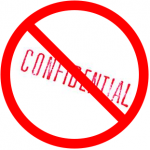ALERT: Don’t use work email to communicate with your personal attorney. You may waive Attorney-Client privilege.
I ‘ve just read a case out of the Federal Court in Idaho (Alamar Ranch, LLC v. City of Boise, 2009 WL 3669741 (D. Idaho Nov. 2, 2009)) which held that emails sent by a non-party to her attorney using a work computer were NOT protected by the attorney-client privilege. The court further held that emails from the attorney to the work email account were also not protected.
‘ve just read a case out of the Federal Court in Idaho (Alamar Ranch, LLC v. City of Boise, 2009 WL 3669741 (D. Idaho Nov. 2, 2009)) which held that emails sent by a non-party to her attorney using a work computer were NOT protected by the attorney-client privilege. The court further held that emails from the attorney to the work email account were also not protected.
This result stems from the company policy that employee emails were subject to monitoring, and were not confidential. (a very common company policy nowadays).
In fact, many companies monitor EVERYTHING their employees do using company computers and network connections, so even using a private, personal email account from a work computer might essentially waive any attorney-client privilege or confidentiality.
One other caveat, some online email providers and social media sites actually track the contents of messages so they can serve you targeted advertising. The question whether this also breaks the confidentiality of attorney-client communications remains open. This is why I, for one, do not use gmail, facebook, myspace or similar services to communicate with clients about their legal matters.
The only true way to be certain your Internet communications are truly secure is to use some form of encryption. Until encrypted email is easier to use, the ‘hassle factor' prevents it from being widely adopted.

That’s a gem! I especially like the part about the lawyer having “constructive knowledge” that the e-mails were not going to be confidential because of the employer’s domain name in the e-mail address. This is a nightmare for lawyers.
Funny, I hadn’t thought about the nightmare for lawyers. I figured it was a client-side issue. Another argument in favor of encryption.
I agree that encryption is a good idea but query whether it solves the privilege issue, given the basis of the Idaho court’s ruling. If privilege can be waived due to knowledge of (or merely the fact of) employer monitoring, an encrypted message between client and attorney starting from (or directed into) an employer’s electronic domain would seem to suffer the same fate. Query further whether using an employer’s phone system to communicate with an attorney also risks waiver. At a minimum, a voicemail from an attorney left with an employee/client that is converted into email through the employer’s email system (increasingly common) would be at risk.
My thinking is that encrypted email would be safER, since the encryption keys would remain privileged and confidential, notwithstanding the disclosure of the encrypted message in the course of discovery, etc. The message (in its encrypted form) would be discoverable, but the content would be unreadable without the key. (sure, it COULD be hacked, but doing so would be costly and difficult) Of course, if the employer has access to the encryption key, then all bets are off.